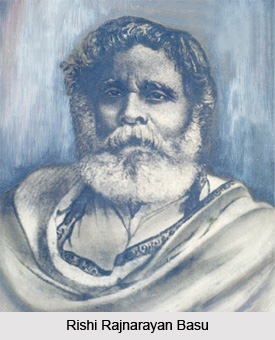Rishi Rajnarayan Basu was a writer and intellectual of the Bengal Renaissance. Born in Boral in 24 Parganas, Rajnarayan Basu studied at the Hare School and Hindu College. A monotheist at heart, Rajnarayan Basu was credited for converting Brahmoism at the age of twenty. After retiring, he was given the honorary title of Rishi or sage. As a writer, Rishi Rajnarayan Basu was one of the best-known prose writers in Bengali in the eighteenth century.
 Rishi Rajnarayan Basu was a popular writer in the Tattwabodhini Patrika, a premier Brahmo journal. Due to his defence of Brahmoism, he was known as the "Grandfather of Indian Nationalism". Rajnarayan Basu was a close friend of Michael Madhusudan Dutt, a prominent poet of the era and the introducer of free verse in Bengali. They came together and introduced the classical Western elements into Bengali literature.
Rishi Rajnarayan Basu was a popular writer in the Tattwabodhini Patrika, a premier Brahmo journal. Due to his defence of Brahmoism, he was known as the "Grandfather of Indian Nationalism". Rajnarayan Basu was a close friend of Michael Madhusudan Dutt, a prominent poet of the era and the introducer of free verse in Bengali. They came together and introduced the classical Western elements into Bengali literature.
Rishi Rajnarayan Basu tutored Asia`s first Nobel prizewinner, Rabindranath Tagore for a brief period and spent three years translating the Upanishads into English. As a member of Young Bengal, he strongly believed in "nation-building" at the grassroots level. With such a determination in his heart, after teaching at Vidyasagar`s Sanskrit College, Rishi Rajnarayan Basu moved to Midnapore to teach in the mofussil district town. He was appointed as the headmaster of Midnapore Zila School, which was both the predecessor of Midnapore Collegiate School and Midnapore College. Rishi Rajnarayan Basu established a public library known as the Rishi Rajnarayan Basu Smriti Pathagar or Rishi Rajnaraya Basu Memorial Library. Rishi Rajnarayan Basu was the first person to suggest using Bengali at meetings of the Vangiya Sahitya Parishad that was established to endorse Bengali language literature yet ironically conducted meetings in English after his request.
As an intellectual, Rishi Rajnarayan Basu was the founder father of the Brahmo Samaj and inaugurated Naba Gopal Mitra`s Hindu Mela, an organization that was created to promote nationalist feelings among Indians. Rishi Rajnarayan Basu was a member of the Indian Association and a political group called the Sanjibani Sabha. Rishi Rajnarayan Basu also started a school in Midnapore promoting the learning of Indian music among the middle-class. In 1868, Rishi Rajnarayan Basu retired and moved to Deoghar and spent the last years of his life.



















